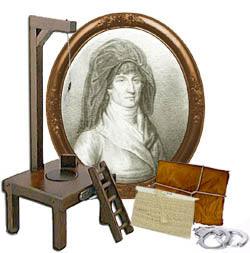She Was Only Anne - On Anne Elliot in Persuasion
by Rosario Mesta Rodríguez

When we think and talk about Jane Austen’s heroines, we tend to associate characteristics such as happiness, bravery, resourcefulness or intelligence to their personalities. We are right to- Jane created numerous female characters such as Emma Woodhouse or Elizabeth Bennet who make us smile everytime we read their feats. We don’t usually associate Jane Austen with sadness or depression. And this time, I have to say, we are wrong: Jane didn’t always write about happy women. In fact, there is a special character that has always stood out within her literary women: Anne Elliot.
Although distant, different, melancholic, resigned and sad, she has been rewarded with the recognition of the public, that, undoubtedly, fell in love with her extraordinary personality. I've always wondered why Jane Austen created someone so different from the sort of characters she usually did. Melancholia and sadness construct the development of the whole novel. Undoubtedly, we should point out that the personal circumstances of the writer at the time is one the main reasons why this book is so different from the others, but also the changes that English society was going through at the beginning of the Nineteenth Century.
The Nineteenth Century Woman
Thanks to the Industrial Revolution, the middle classes started to grow due to changes in commerce and economy, and so did the level of literacy among people. The novel began to become popular, especially among women. For the first time, people wanted to read, they demanded books, they had a desire to be more conscious about the world, their surroundings, and themselves. By reading, people became more aware of their own feelings, personalities and for the very first time, the internal landscape started to gain ground on the material things in life and on outward appearances. Romanticism showed the disappointment of the society with the rationalization of the Enlightenment. People looked for other concepts such as feelings and emotions. As such, pessimism prospered and the whole range of the negative feelings began to be explored with Red and Black by Sthendal and the Letters of the young Werther by Goethe as standard bearers. 
At this moment in history we must analyze how these new currents affected women, who had (as always) a more difficult time. Not only did their access to popular literature arouse doubts among the most conservative sectors, but they were also frowned upon for the introspection and sentimentality that flooded them. And this is because there was a well-established ideal female model in the Eighteenth and Nineteenth Centuries, and everything that went beyond its limits was called abnormal, dangerous, unnatural. This model was largely propagated by the manuals of conduct, which were hugely popular among society. Jane Austen herself could even be an assiduous reader of some of them, as shown by the inclusion of Fordyce's Sermons in Pride and Prejudice.
The Manuals of Conduct
The manuals dictated rules that ranged from the appreciation of one's own body to female education, domestic economy or even behavior and body language in social gatherings. The woman was limited by an ideological corset that asphyxiated her reality. One of the premises that has struck me most has been the concept of melancholy. The authors of the manuals (always men), were repulsed by the revolution that brought with it Romanticism, and they affirmed with vehemence, and sometimes with violence, how the melancholy, sentimentality and depression that began to be treated in the wake of the increasingly popular readings, was inappropriate for women. In fact, this didactic literature begins a huge campaign in favor of the perfect woman, and, among its qualities, joy stands out. A woman could not afford to be sad, depressed or taciturn, since women should be the nucleus of the family unit; always attentive, willing and energetic to meet the demands of children and husbands.
Joy, for John Bennet, was "a most desirable quality in a woman" (41), "a striking quality is her constant cheerfulness" (On a Variety of Useful and Interesting Subjects calculated to Improve the heart, to form the Manners, and Enlighten the understanding, 40). A Father's Legacy by John Gregory presupposes that a spirit always on the rise "will make your company much solicited (36) and in the sermon XIII by Fordyce it is said that “the woman considers herself here a saint who must support everything. Men should look for a shy, complacent, sweet and patient woman who must be at home, not fighting outside and getting her clothes dirty” (112). According again to John Bennet, women had no reason to be sad, since "men are perplexed with various anxieties of business and ambition, are naturally, more thoughtful, profound and melancholy; They were certainly formed to sooth and to enliven. It is one of the greatest blessings we derive from their society, and from the most sacred of all connections "(42). He goes on to affirm that "men melancholy is as remote from the true point of gracefulness, in the sex, as ill-natured wit, or ironical pertness" (43).
Perfection in Persuasion
I find it quite curious to see how this theme contrasts with the novel Persuasion. Jane builds a character that rebels against all modeling of women. Anne Elliot allows herself the luxury of being sad, of not hiding it from others, as well as getting angry. She does not care for what society might think of her. The death of her mother during her youth and the loss of her true love certainly leave their mark on Anne. Since then, she resigns herself to living as the person in charge of the welfare of her family, without anyone worrying about her, she becomes blurred with time, and this leaves her vulnerable, opaque: “but Anne, with an elegance of mind and sweetness of character, which must have placed her high with any people with real understanding, was nobody with either father or sister: her word had no weight; her convenience was always to give way, she was only Anne ". In addition, the saddest of all the heroines faces a family opposition that leaves her even more alone. We can see the indifference of her family within Elizabeth Elliot’s speech before travelling to Bath: “Then I am sure Anne had better stay, for nobody will want her in Bath”. She is aware of this treatment and apparently, she is resigned. “excepting one short period of her life, she had never, since the age of fourteen, never since the loss of her dear mother, known the happiness of being listened to, or encouraged by any just appreciation or real taste”.

Step by step, she becomes more and more invisible: “She could do little more than listen patiently, soften every grievance, and excuse each to the other; give them all hints of the forbearance necessary between such near neighbours, and make those hints broadest which were meant for her sister´s benefit”. Paradoxically, Austen also uses music to show Anne’s lack of connection with those around her. “Anne had been always used to feel alone in the world”.
Although the other “girls were wild for dancing” (48), Anne is isolated from the group, sitting removed from them at the piano - in music she had been always used to feel alone in the world. But she does not want to cause grief, she knows that she is the first cause of this situation and her mistakes, and carries with them her whole life. She no longer holds grudges, melancholy transcends her life. She does not follow the examples of perfection that manuals and society try to instill in women, she is a woman who suffers, who has anxiety crisis', “she was ashamed of herself, quite ashamed of being so nervous, so overcome by such a trifle, but so it was; and it required a long application of solitude and reflection to recover it”. It's OK To Be Sad With the example of Anne Elliot, Jane Austen vindicates the imperfect woman, the one who also suffers, because through suffering comes self-growth. Jane claims in Persuasion that sadness is also part of women's lives and that it fulfils an essential function. Sadness reduces attention in the external world to focus on the inside. This favors self-examination, reflection, analysis. Anne goes through a complete exploration of her own knowledge of herself throughout the novel, and in a way that few Austen's other heroines do. Anne was not just Anne, Anne shows us her act of bravery by letting us know that sadness is just another emotion. It is the emotion that most leads us to intimacy with ourselves and with others.
*****
About the author Rosario Mesta Rodríguez is a Spanish librarian who is obsessed with Jane Austen and with the Victorian Era. She's currently studying a PhD in Conduct Books for women in Eighteenth Century England. Books are her passion. Enjoyed this article about Anne Elliot? Take a look at our copies of Persuasion available in our online gift shop.



3 comments
Excellent. Write more.
Anonymous
This is a brilliant analysis of Anne Elliot. Well done Rosario Mesta Rodríguez
Thomas Peberdy
I love Persuasion, and the character of Anne Elliot is very close to my heart. She is a more mature heroine, and by the standards of Austen’s day should have been married by the time she’d reached the grand “old age” of 27!
Life hasn’t been easy for Anne: she lacks not only a mother, who died when Anne was only 14, but her father is pompous, arrogant, uncaring and conceited, his attention being wholly centred on his own personal appearance and on his eldest daughter Elizabeth, who is cast in the same mould as himself. Mary, Anne’s other sister, is also not a sympathetic character and Anne has no real friends or confidantes in her immediate family, who see her as ‘only Anne’, to be used for their own ends by all of them, and shown scant consideration.
It spite of all this, it is wonderful to see her character develop as the book proceeds – and she is re-acquainted with the former love of her life, Frederick Wentworth. I find Persuasion a gentle, wistful but inspiring book, and even more so since it was not published until after the death of Jane Austen, so it is part of her final legacy to us. Austen’s love of her Naval officer brothers – and her respect for the men of the Navy – shine through the book.
Anonymous
Leave a comment
This site is protected by hCaptcha and the hCaptcha Privacy Policy and Terms of Service apply.